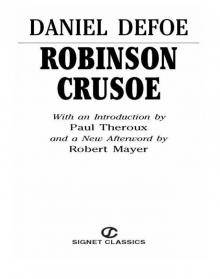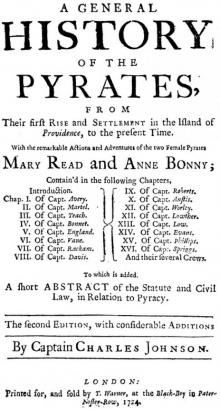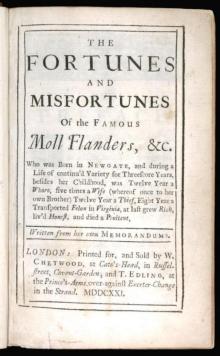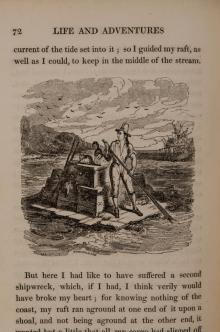- Home
- Daniel Defoe
Moll Flanders Page 7
Moll Flanders Read online
Page 7
Vanity is the perfection of a fop. My husband had this excellence, that he valued nothing of expense. As his history, you may be sure, has very little weight in it, ’tis enough to tell you that in about two years and a quarter he broke, got into a sponging-house, being arrested in an action too heavy for him to give bail to, so he sent for me to come to him.
It was no surprise to me, for I had foreseen something before that all was going to wreck and had been taking care to reserve something, if I could, for myself; but when he sent for me, he behaved much better than I expected. He told me plainly he had played the fool and suffered himself to be surprised, which he might have prevented; that now he foresaw he could not stand it, and therefore he would have me go home and in the night take away everything I had in the house of any value and secure it; and after that, he told me that if I could get away £100 or £200 in goods out of the shop, I should do it; “only,” says he, “let me know nothing of it, neither what you take or whither you carry it; for as for me,” says he, “I am resolved to get out of this house and be gone; and if you never hear of me more, my dear,” says he, “I wish you well; I am only sorry for the injury I have done you.” He said some very handsome things to me indeed at parting; for I told you he was a gentleman, and that was all the benefit I had of his being so; that he used me very handsomely even to the last, only spent all I had and left me to rob the creditors for something to subsist on.
However, I did as he bade me, that you may be sure; and having thus taken my leave of him, I never saw him more, for he found means to break out of the bailiff’s house that night or the next; how, I knew not, for I could come at no knowledge of anything more than this: that he came home about three o’clock in the morning, caused the rest of his goods to be removed into the Mint, and the shop to be shut up; and having raised what money he could, he got over to France, from whence I had one or two letters from him and no more.
I did not see him when he came home, for he having given me such instructions as above and I having made the best of my time, I had no more business back again at the house, not knowing but I might have been stopped there by the creditors; for a commission of bankrupt being soon after issued, they might have stopped me by orders from the commissioners. But my husband, having desperately got out from the bailiff’s by letting himself down from almost the top of the house to the top of another building and leaping from thence, which was almost two stories and which was enough indeed to have broken his neck, he came home and got away his goods before the creditors could come to seize; that is to say, before they could get out the commission and be ready to send their officers to take possession.
My husband was so civil to me, for still I say he was much of a gentleman, that in the first letter he wrote me he let me know where he had pawned twenty pieces of fine holland for £30, which were worth above £90, and enclosed me the token for the taking them up, paying the money, which I did and made in time above £100 of them, having leisure to cut them and sell them to private families as opportunity offered.
However, with all this and all that I had secured before, I found, upon casting things up, my case was very much altered and my fortune much lessened; for, including the hollands and a parcel of fine muslins, which I carried off before, and some plate and other things, I found I could hardly muster up £500; and my condition was very odd, for though I had no child (I had had one by my gentleman-draper, but it was buried), yet I was a widow bewitched, I had a husband and no husband, and I could not pretend to marry again though I knew well enough my husband would never see England any more if he lived fifty years. Thus, I say, I was limited from marriage, what offer soever might be made me; and I had not one friend to advise with in the condition I was in, at least not one who I could trust the secret of my circumstances to; for if the commissioners were to have been informed where I was, I should have been fetched up and all I had saved be taken away.
Upon these apprehensions, the first thing I did was to go quite out of my knowledge and go by another name. This I did effectually, for I went into the Mint too, took lodgings in a very private place, dressed me up in the habit of a widow, and called myself Mrs. Flanders.
Here, however, I concealed myself, and though my new acquaintance knew nothing of me, yet I soon got a great deal of company about me; and whether it be that women are scarce among the people that generally are to be found there or that some consolations in the miseries of that place are more requisite than on other occasions, I soon found that an agreeable woman was exceedingly valuable among the sons of affliction there; and that those that could not pay half a crown in the pound to their creditors, and run in debt at the sign of the Bull for their dinners, would yet find money for a supper if they liked the woman.
However, I kept myself safe yet, though I began, like my Lord Rochester’s mistress, that loved his company but would not admit him farther, to have the scandal of a whore without the joy; and upon this score, tired with the place and with the company too, I began to think of removing.
It was indeed a subject of strange reflection to me, to see men in the most perplexed circumstances, who were reduced some degrees below being ruined, whose families were objects of their own terror and other people’s charity, yet while a penny lasted, nay, even beyond it, endeavouring to drown their sorrow in their wickedness; heaping up more guilt upon themselves, labouring to forget former things which now it was the proper time to remember, making more work for repentance, and sinning on as a remedy for sin past.
But it is none of my talent to preach; these men were too wicked even for me. There was something horrid and absurd in their way of sinning, for it was all a force even upon themselves; they did not only act against conscience, but against nature, and nothing was more easy than to see how sighs would interrupt their songs, and paleness and anguish sit upon their brows, in spite of the forced smiles they put on; nay, sometimes it would break out at their very mouths, when they had parted with their money for a lewd treat or a wicked embrace. I have heard them, turning about, fetch a deep sigh and cry, “What a dog am I! Well, Betty, my dear, I’ll drink thy health, though,” meaning the honest wife, that perhaps had not a half-crown for herself and three or four children. The next morning they were at their penitentials again, and perhaps the poor weeping wife comes over to him, either brings him some account of what his creditors are doing and how she and the children are turned out-of-doors, or some other dreadful news; and this adds to his self-reproaches; but when he has thought and pored on it till he is almost mad, having no principles to support him, nothing within him or above him to comfort him, but finding it all darkness on every side, he flies to the same relief again, viz., to drink it away, debauch it away; and falling into company of men in just the same condition with himself, he repeats the crime and thus he goes every day one step onward of his way to destruction.
I was not wicked enough for such fellows as these. Yet, on the contrary, I began to consider here very seriously what I had to do, how things stood with me, and what course I ought to take. I knew I had no friends, no, not one friend or relation in the world; and that little I had left apparently wasted, which when it was gone, I saw nothing but misery and starving was before me. Upon these considerations, I say, and filled with horror at the place I was in, I resolved to be gone.
I had made an acquaintance with a sober, good sort of a woman, who was a widow, too, like me, but in better circumstances. Her husband had been a captain of a ship, and having had the misfortune to be cast away coming home from the West Indies, was so reduced by the loss that though he had saved his life then, it broke his heart and killed him afterwards; and his widow, being pursued by the creditors, was forced to take shelter in the Mint. She soon made things up with the help of friends and was at liberty again; and finding that I rather was there to be concealed than by any particular prosecutions, and finding also that I agreed with her, or rather she with me, in a just abhorrence of the place and of the company, she invited me to go home with he
r till I could put myself in some posture of settling in the world to my mind; withal telling me that it was ten to one but some good captain of a ship might take a fancy to me and court me in that part of the town where she lived.
I accepted of her offer and was with her half a year and should have been longer, but in that interval what she proposed to me happened to herself, and she married very much to her advantage. But whose fortune soever was upon the increase, mine seemed to be upon the wane, and I found nothing present except two or three boatswains or such fellows, but as for the commanders, they were generally of two sorts. 1. Such as, having good business, that is to say, a good ship, resolved not to marry but with advantage. 2. Such as, being out of employ, wanted a wife to help them to a ship; I mean (1) a wife, who, having some money, could enable them to hold a good part of a ship themselves, so to encourage owners to come in; or (2) a wife who if she had not money had friends who were concerned in shipping, and so could help to put the young man into a good ship; and neither of these was my case, so I looked like one that was to lie on hand.
This knowledge I soon learnt by experience, viz., that the state of things was altered as to matrimony, that marriages were here the consequences of politic schemes, for forming interests, carrying on business, and that love had no share or but very little in the matter.
That as my sister-in-law at Colchester had said, beauty, wit, manners, sense, good humour, good behaviour, education, virtue, piety, or any other qualification, whether of body or mind, had no power to recommend; that money only made a woman agreeable; that men chose mistresses indeed by the gust of their affection, and it was requisite for a whore to be handsome, well shaped, have a good mien and a graceful behaviour; but that for a wife, no deformity would shock the fancy, no ill qualities the judgement; the money was the thing; the portion was neither crooked or monstrous, but the money was always agreeable, whatever the wife was.
On the other hand, as the market run all on the men’s side, I found the women had lost the privilege of saying no; that it was a favour now for a woman to have the question asked, and if any young lady had so much arrogance as to counterfeit a negative, she never had the opportunity of denying twice, much less of recovering that false step and accepting what she had seemed to decline. The men had such choice everywhere that the case of the women was very unhappy; for they seemed to ply at every door, and if the man was by great chance refused at one house, he was sure to be received at the next.
Besides this, I observed that the men made no scruple to set themselves out and to go a-fortune-hunting, as they call it, when they had really no fortune themselves to demand it or merit to deserve it; and they carried it so high that a woman was scarce allowed to inquire after the character or estate of the person that pretended to her. This I had an example of in a young lady at the next house to me and with whom I had contracted an intimacy; she was courted by a young captain, and though she had near £2000 to her fortune, she did but inquire of some of his neighbours about his character, his morals, or substance, and he took occasion at the next visit to let her know, truly, that he took it very ill and that he should not give her the trouble of his visits any more. I heard of it, and I had begun my acquaintance with her. I went to see her upon it; she entered into a close conversation with me about it and unbosomed herself very freely. I perceived presently that though she thought herself very ill-used, yet she had no power to resent it; that she was exceedingly piqued she had lost him and particularly that another of less fortune had gained him.
I fortified her mind against such a meanness, as I called it; I told her that as low as I was in the world, I would have despised a man that should think I ought to take him upon his own recommendation only; also I told her that as she had a good fortune, she had no need to stoop to the disaster of the times; that it was enough that the men could insult us that had but little money, but if she suffered such an affront to pass upon her without resenting it, she would be rendered low-prized upon all occasions; that a woman can never want an opportunity to be revenged of a man that has used her ill, and that there were ways enough to humble such a fellow as that or else certainly women were the most unhappy creatures in the world.
She was very well pleased with the discourse and told me seriously that she would be very glad to make him sensible of her resentment, and either to bring him on again or have the satisfaction of her revenge being as public as possible.
I told her that if she would take my advice, I would tell her how she should obtain her wishes in both those things; and that I would engage I would bring the man to her door again and make him beg to be let in. She smiled at that and soon let me see that if he came to her door, her resentment was not so great to let him stand long there.
However, she listened very willingly to my offer of advice; so I told her that the first thing she ought to do was a piece of justice to herself, namely, that whereas he had reported among the ladies that he had left her, and pretended to give the advantage of the negative to himself, she should take care to have it well spread among the women, which she could not fail of an opportunity to do, that she had inquired into his circumstances and found he was not the man he pretended to be. “Let them be told, too, madam,” said I, “that you found he was not the man you expected and that you thought it was not safe to meddle with him; that you heard he was of an ill temper, and that he boasted how he had used the women ill upon many occasions, and that particularly he was debauched in his morals,” etc. The last of which, indeed, had some truth in it, but I did not find that she seemed to like him much the worse for that part.
She came most readily into all this, and immediately she went to work to find instruments. She had very little difficulty in the search, for telling her story in general to a couple of her gossips, it was the chat of the tea-table all over that part of the town, and I met with it wherever I visited; also as it was known that I was acquainted with the young lady herself, my opinion was asked very often, and I confirmed it with all the necessary aggravations and set out his character in the blackest colours; and as a piece of secret intelligence, I added what the gossips knew nothing of, viz., that I had heard he was in very bad circumstances; that he was under a necessity of a fortune to support his interest with the owners of the ship he commanded; that his own part was not paid for, and if it was not paid quickly, his owners would put him out of the ship, and his chief mate was likely to command it, who offered to buy that part which the captain had promised to take.
I added, for I was heartily piqued at the rogue, as I called him, that I had heard a rumour too that he had a wife alive at Plymouth and another in the West Indies, a thing which they all knew was not very uncommon for such kind of gentlemen.
This worked as we both desired it, for presently the young lady at the next door, who had a father and mother that governed both her and her fortune, was shut up, and her father forbid him the house. Also in one place more the woman had the courage, however strange it was, to say no; and he could try nowhere but he was reproached with his pride, and that he pretended not to give the women leave to inquire into his character, and the like.
By this time he began to be sensible of his mistake, and seeing all the women on that side the water alarmed, he went over to Ratcliff and got access to some of the ladies there; but though the young women there too were, according to the fate of the day, pretty willing to be asked, yet such was his ill luck that his character followed him over the water; so that though he might have had wives enough, yet it did not happen among the women that had good fortunes, which was what he wanted.
But this was not all; she very ingeniously managed another thing herself, for she got a young gentleman who was a relation to come and visit her two or three times a week in a very fine chariot and good liveries, and her two agents and I also presently spread a report all over that this gentleman came to court her; that he was a gentleman of a thousand pounds a year, and that he was fallen in love with her, and that she was going to her aunt’s
in the city because it was inconvenient for the gentleman to come to her with his coach to Rotherhithe, the streets being so narrow and difficult.
This took immediately. The captain was laughed at in all companies, and was ready to hang himself; he tried all the ways possible to come at her again and wrote the most passionate letters to her in the world; and in short, by great application, obtained leave to wait on her again, as he said, only to clear his reputation.
At this meeting she had her full revenge of him; for she told him she wondered what he took her to be that she should admit any man to a treaty of so much consequence as that of marriage without inquiring into his circumstances; that if he thought she was to be huffed into wedlock and that she was in the same circumstances which her neighbours might be in, viz., to take up the first good Christian that came, he was mistaken; that, in a word, his character was really bad or he was very ill beholden to his neighbours; and that unless he could clear up some points in which she had justly been prejudiced, she had no more to say to him but give him the satisfaction of knowing that she was not afraid to say no either to him or any man else.

 Captain Singleton
Captain Singleton An Essay Upon Projects
An Essay Upon Projects Moll Flanders Moll Flanders Moll Flanders
Moll Flanders Moll Flanders Moll Flanders The Further Adventures of Robinson Crusoe
The Further Adventures of Robinson Crusoe Everybody's Business Is Nobody's Business
Everybody's Business Is Nobody's Business Robinson Crusoe
Robinson Crusoe The Storm
The Storm The King of Pirates
The King of Pirates History of the Plague in London
History of the Plague in London Memoirs of a Cavalier
Memoirs of a Cavalier_preview.jpg) The Life and Most Surprising Adventures of Robinson Crusoe, of York, Mariner (1801)
The Life and Most Surprising Adventures of Robinson Crusoe, of York, Mariner (1801) A Journal of the Plague Year
A Journal of the Plague Year_preview.jpg) The Life and Adventures of Robinson Crusoe (1808)
The Life and Adventures of Robinson Crusoe (1808) A General History of the Pyrates: / from their first rise and settlement in the island of Providence, to the present time
A General History of the Pyrates: / from their first rise and settlement in the island of Providence, to the present time The Fortunes and Misfortunes of the Famous Moll Flanders
The Fortunes and Misfortunes of the Famous Moll Flanders_preview.jpg) The Fortunate Mistress (Parts 1 and 2)
The Fortunate Mistress (Parts 1 and 2) Robinson Crusoe — in Words of One Syllable
Robinson Crusoe — in Words of One Syllable From London to Land's End
From London to Land's End A New Voyage Round the World by a Course Never Sailed Before
A New Voyage Round the World by a Course Never Sailed Before Roxana
Roxana The Life and Adventures of Robinson Crusoe of York, Mariner, Volume 1
The Life and Adventures of Robinson Crusoe of York, Mariner, Volume 1_preview.jpg) Memoirs of Major Alexander Ramkins (1718)
Memoirs of Major Alexander Ramkins (1718) Dickory Cronke
Dickory Cronke Robinson Crusoe (Penguin ed.)
Robinson Crusoe (Penguin ed.) Moll Flanders
Moll Flanders The Further Adventures of Robinson Crusoe rc-2
The Further Adventures of Robinson Crusoe rc-2